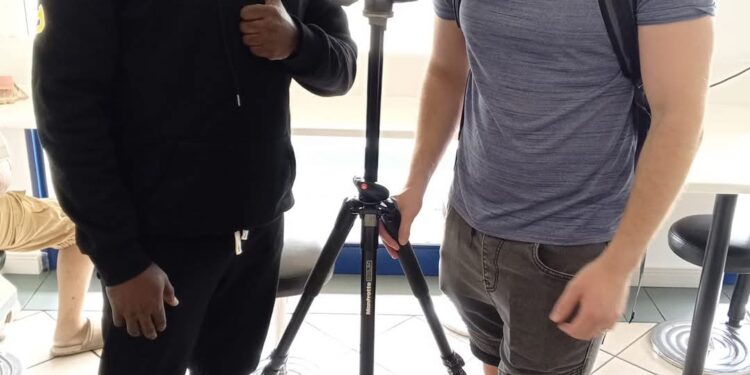
By Ibrahim Kegbegbe
When I met Robin Mathews on October 9, 2024, in Cape Town, South Africa, the air was warm with creative energy. Robin, a renowned South African photographer whose lens has captured everything from the soul of township life to the glamour of African fashion, spoke with the quiet confidence of a man who understands the power of the camera—not just to frame beauty, but to freeze truth.
As a Nigerian journalist on an investigative mission into Africa’s entertainment industries, my encounter with Robin reminded me of the vast potential hidden in the continent’s visual storytelling space. And for every young African seeking a meaningful, expressive career, photography or photojournalism may just be the perfect path.
READ ALSO:Why Nigerian Students No Longer Read: Booksellers Reveal the Harsh Truth
Robin Mathews on Photography: “It’s About Telling the Truth Beautifully”
“People think photography is just about taking nice pictures,” Robin told me as we walked through the colorful streets of Bo-Kaap. “But if you do it right, you’re telling someone’s story—and sometimes, that story can change how people see the world.”
Robin, who began his journey with a borrowed camera and a dream, emphasized that photography isn’t about having the best equipment. “You start with your eyes, your heart, and your instinct. The camera comes later,” he said.
When I asked about the difference between a photographer and a photojournalist, Robin smiled. “Both use the same tool, but for different battles,” he said. “A photographer captures beauty, emotion, and creativity. A photojournalist captures history as it’s happening. The rules are stricter—no staging, no filters—just truth, in the rawest form.”
Becoming a Visual Storyteller: Advice for Aspiring Creatives
To every aspiring photographer or photojournalist, Robin’s message was clear: start with what you have, and grow from there. “There’s no perfect moment to begin. Start today. Your neighborhood, your friends, your own life—these are all stories worth documenting,” he encouraged.
READ ALSO:The Lagos Governorship Plot: Why Seyi Tinubu Is a 2031 Project, Not 2027
He also stressed the importance of learning, not just by watching YouTube tutorials, but by going out to shoot, networking with other creatives, and understanding the ethics of visual storytelling.
Why Africa Needs More Eyes Behind the Camera
Africa, Robin and I agreed, is one of the most visually compelling continents on the planet—but it is also one of the most misrepresented. “There’s a hunger for authentic African stories, especially visuals that reflect the real, the beautiful, and the complex Africa we live in,” he said.
As photojournalists, our role becomes not just to document, but to correct the narrative. From bustling markets in Lagos to serene beaches in Zanzibar, every corner of this continent has a story that the world needs to see—accurately and powerfully.
Photography as Purpose, Not Just a Profession
Robin concluded our conversation with words that have stayed with me: “Don’t just take pictures—make meaning. If you’re in it only for likes or money, you’ll burn out fast. But if you’re in it for the story, the people, the culture—you’ll never run out of inspiration.”
That’s the heart of it. Whether you choose to be a photographer or a photojournalist, you are stepping into a career that blends art with activism, beauty with responsibility.
READ ALSO:The Lagos Governorship Plot (II): Ambode’s Redemption: Lagos APC’s Secret Weapon for 2027
Final Word to Aspiring Photographers and Photojournalists
To those with a passion for visuals, don’t wait for perfect tools or conditions. Pick up your camera—or your phone—and start capturing the world around you. Learn. Practice. Share. Collaborate.
Africa’s stories are waiting. And your lens might be the one to bring them to life.
















